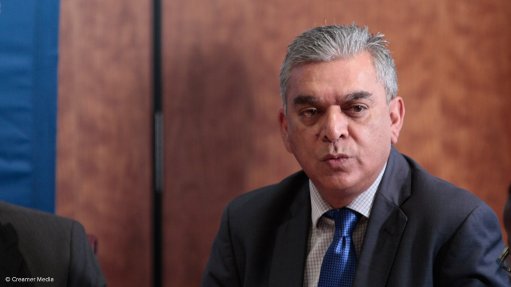
Denel CEO Riaz Saloojee
Photo by: Duane Daws
South African State-owned defence industrial group Denel on Thursday reported that it had enjoyed a most successful financial year during 2014/2015. "This has been another really good year for us," enthused Group CEO Riaz Saloojee. "This year under review was a remarkable one for us. We've grown revenues by a billion rand over the last year."
The group's revenues rose by 28%, or by more than R1.3-billion, to R5.85-billion. Net profit reached R270-million, an increase of R76-million over the 2013/2014 financial year. Its order book now stands at R35-billion (in 2009, it was just R4.069-billion). Earnings before interest and tax hit R399-million, a jump of 41%. Denel's debt:equity ratio held steady at 1:1. Exports accounted for 52% of group revenues.
"The theme for Denel for the past year has been to go from a good company to a great company," he stated. "I can truly say that Denel really is a global company. We have a footprint around the world." The group has supplied markets in Africa, the Asia/Pacific, Europe, the Middle East and South America as well as South Africa.
"We have to invest in this business significantly, to make sure we keep up with international trends," he pointed out. "We've become really globally competitive. We're competing with the best defence companies in the world." This was particularly so regarding guided missiles and unmanned air vehicles.
"It is indeed a good story to tell," affirmed Group CFO Fikile Mhlontlo. "All of the businesses are performing positively. [Denel] Aerostructures is about to break even. The expectation is that it will break even next year." He forecast that revenues will continue to rise next year and that within ten years the group will have twice the revenues it has today.
"The board welcomes the sustained improvement in the operational and financial performance of the company," reported outgoing board chairman Martie Janse van Rensburg. "We have to agree this has been a successful turnaround. As the outgoing board, we are pleased to leave Denel on a sustainable growth trajectory. ... The company today is undeniably on a long-term sustainable growth trajectory."
She credited the success of the turnaround to four main elements. "A singular focus on the drivers that would make a difference," was the first. Then teamwork between the board, the executive and the employees, all working together to achieve the same goals. The attitude and support of the shareholder (the government) was next: the government now sees Denel as a strategic asset. The fourth element was governance: the board understood its role and did not try and act as an executive; there was honesty, "lots of robust debate" and trust (between the board, executive and employees).
"The trajectory we are on at the moment -- we need to be sustainable, we need to make the government [strategically] independent," concluded Saloojee. "We hope we will be able to maintain this level of growth and sustainability."